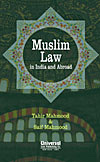Dr. Tahir Mahmood and Dr. Saif Mahmood Publish Muslim Law in India and Abroad

The 34th book by renowned Muslim scholar Dr. Tahir Mahmood has just been published by the Universal Law Publishing Co. The work, Muslim Law in India and Abroad, is co-authored by Dr. Mahmood’s son, Dr. Saif Mahmood, Advocate, Supreme Court of India. Earlier versions of this book have been extensively cited in many Supreme Court and High Court judgments, and the work is considered as the most reliable contemporary authority on the Muslim Law of India.
The book was launched on Tuesday, 27 March 2012, at the Indian Law Institute, New Delhi by Hon’ble Mr. Justice Altamas Kabir, Chief Justice of India-designate, at a function jointly organized by the the Association of Scholars of Religion and Law and the publishers. Hon’ble Mr. Justice Badar Durrez Ahmad, Judge, High Court of Delhi spoke on the book and Mr. Soli J. Sorabjee, Former Attorney General for India presided.
“Muslims are the second largest religious community of India and therefore their personal law constitutes an important chapter of the Nation’s legal system,” notes the book’s publisher. “This book offers a comprehensive study of the entire gamut of Muslim law as applicable in India. Extensive critiques of each of the legislative enactments of India in this sphere are followed by a lucid exposition of the principles of uncodified Muslim law in their true spirit and in conformity with the present-day social conditions. With a view to inviting attention to the contemporary understanding of Muslim law elsewhere, the book ends with glimpses of its reform in many of the Muslim-dominated and Muslim-minority countries. Texts of all statutory laws of India on the subject are included in the book and cases coverage is until January 2012.”
Dr. Mahmood is well-known in India and abroad for his expertise in religion and the law, human rights, and civil liberties. A globally noted authority on Islamic Law, Legal Systems of the Arab World, and Hindu Law, he was the first Muslim to be named to the Law Commission of India, an executive advisory body established by order of the Government of India to work for legal reform, and for which he served as the only permanent member of the Eighteenth Commission, succeed on 1 September 2010 by the Nineteenth Commission.
Among his many other honors, Professor Mahmood received the Distinguished Service Award from the International Center for Law and Religion Studies on 3 October 2010. In July 2010 he received the 7th prestigious “Shah Waliullah Award” from the Institute for Objective Studies, for outstanding contribution in the field of Islamic law. The chosen field for the award was “Islamic Law in Comparative Perspective.” In the words of Justice VR Krishna Iyer, formerly of the Supreme Court of India, “There is hardly anybody more competent than Dr. Tahir Mahmood – that distinguished scholar, powerful speaker and prolific writer – to tell the Indians what currently Islamic law is in the Muslim countries. Do read Dr. Mahmood as a storehouse of Islamic law. Even those who oppose him need him; they must read him.”
Professor Mahmood has been Dean, Faculty of Law, University of Delhi; Chairman, National Commission for Minorities; Member, National Human Rights Commission; and Jurist-Member, Ranganath Misra Commission. He has written and edited more than two dozen books and 500 research papers. His academic work is widely acclaimed and has been cited by the Supreme Court of India and many State High Courts in more than 20 judgments besides being prescribed by many Indian and foreign universities for higher legal studies. He has delivered numerous lectures at internationally renowned Universities. As an expert on family laws, he has advised the International Commission of Jurists and many foreign governments.
Professor Mahmood is associated in different capacities with a number of notable Indian and foreign academic, legal, and human rights organizations, including the International Society on Family Law, Paris; the Vienna Christian-Islamic Round Table; the International Consortium for Law and Religion Studies, based in Milan; the Institute of Muslim Minority Affairs, Jeddah; and the Committee for Drafting the Model Constitution for Islamic Countries, Kuala Lumpur. He a member of the Academic Advisory Board of the International Center for Law and Religion Studies, Brigham Young University. He is also the academic founder of many law schools in India, including the Amity Institute of Advanced Legal Studies of which he is the Honorary Chairman.